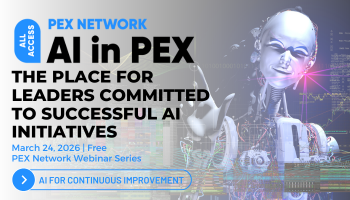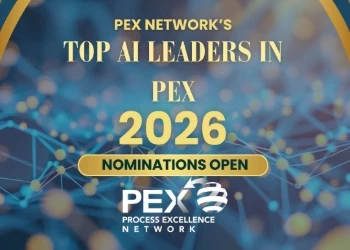AI lessons from Walmart, Mars, Heineken & Microsoft
The key trends, opportunities and challenges shaping today’s AI landscape
Add bookmark
All Access: AI in PEX webinar series brought together thought leaders, practitioners and innovators to explore the rapid advancements in artificial intelligence (AI) and its transformative impact on business processes in organizations.
With insights from Walmart, Mars, Heineken and Microsoft, the event presented trends, challenges and practical insights shared by industry experts.
Join the PEX Network community

Don't miss any news, updates or insider tips from PEX Network by getting them delivered to your inbox. Sign up to our newsletter and join our community of experts.
Learn MoreWalmart’s approach to AI integration
In the opening session, led by Michael Hill, editor of PEX Network, David Glick, SVP of enterprise business services at Walmart, shared the retail giant’s strategic approach to AI adoption, emphasizing the integration of AI into daily operations for all associates.
Highlighting the importance of accessible AI tools, he outlined three critical strategies for Walmart’s AI integration:
- Utilizing existing tools: Leveraging current AI technologies allows for immediate benefits without the need for extensive development.
- Pair programming: Collaborating closely between product managers and engineers fosters rapid prototyping and more effective tool deployment.
- Custom AI agents: Developing tailored AI solutions to meet specific business needs enhances employee productivity.
Glick emphasized that persistence is crucial when working with AI, particularly language models, urging organizations to focus on providing employees with hands-on training. He stated that the biggest pitfall lies in underutilization of AI, emphasizing that organizations should encourage experimentation to build employee confidence in these technologies.
Watch the full session with David Glick now!
Tailoring AI solutions to maximize ROI
FlowForma showcased a case study on how AI integration transformed the operations of a wealth management firm grappling with growth-related challenges. Their approach to process automation resulted in a 65 percent reduction in approval times and significant efficiency improvements through digitization.
Another significant session featured Celonis discussing how organizations can maximize the return on investment (ROI) from enterprise AI deployments through process intelligence. The presentation addressed how organizations need to focus on data accuracy and change management for successful AI implementation.
Workforce skills and fostering an AI-driven culture
Lyudmila Todorovska, head of global digital and technology, at Heineken, Zachary Keenan, AI leader at Microsoft and Crystal Broj, enterprise chief digital transformation officer at University of South Carolina discussed the workforce skills necessary for effective AI integration.
They highlighted the importance of fostering curiosity and adaptability, along with addressing employee concerns related to job displacement. The panelists emphasized a culture of innovation and experimentation, which is critical in aligning AI initiatives with overall business strategy.
See the full panel discussion!
The evolution of agentic AI
The second day was marked by a session led by Lee Bogner, global chief generative AI, ecommerce strategic enterprise architect at Mars Inc. on the evolution of agentic AI. He described the transition from traditional automation methods to the use of autonomous agents, reiterating the importance of data quality and legacy integration. Bogner presented five crucial components for implementing AI agents, advocating for a methodical approach to overcome challenges.
Watch the session with Lee Bogner now!
Process platforms as catalysts for AI
Medhat Galal, SVP of engineering at Appian, discussed how process platforms are essential for unlocking AI’s potential within enterprises. He emphasized the need for a comprehensive approach to AI implementation that prevents fragmentation and silos. Galal presented key use cases driving value, including agentic behaviors and document processing, while advocating for a process-first approach to AI integration.
Prof. Marlon Dumas, chief product officer at Apromore, highlighted the importance of balancing broad and deep analysis when implementing process improvements. He stressed that combining various data-driven methods can substantially enhance operational efficiency and customer satisfaction.
AI transformations in business intelligence
The last session of day two featured Erika Moreno and PeggySue Werthessen from Strategy, who illustrated how AI is revolutionizing business intelligence (BI). They discussed the introduction of tools for enhanced data modeling and insights generation. Emphasizing the need for data quality, they underscored that strategic impacts of AI could lead to increased decision velocity and democratized data access.
Conclusion
All Access: AI in PEX webinar series provided a wealth of insights into how organizations can effectively implement AI technologies within their operations. From practical strategies for overcoming implementation challenges to showcasing the transformative potential of AI in various business aspects, the sessions captured the importance of data quality to drive their organizations forward in the AI era.
The event emphasized that embracing AI and fostering a culture of experimentation and learning will be key to thriving in tomorrow’s business landscape.
All Access: AI in Process Excellence 2026

Don’t get left behind. Join us at All Access: AI in Process Excellence to learn from leading experts, thought leaders, and practitioners who are on the ground experimenting, researching, and learning how to best use AI. They will share their secrets with you for free. And you’ll have the opportunity to network with fellow professionals as we navigate this new world. Register now to save your spot.
Register Now













